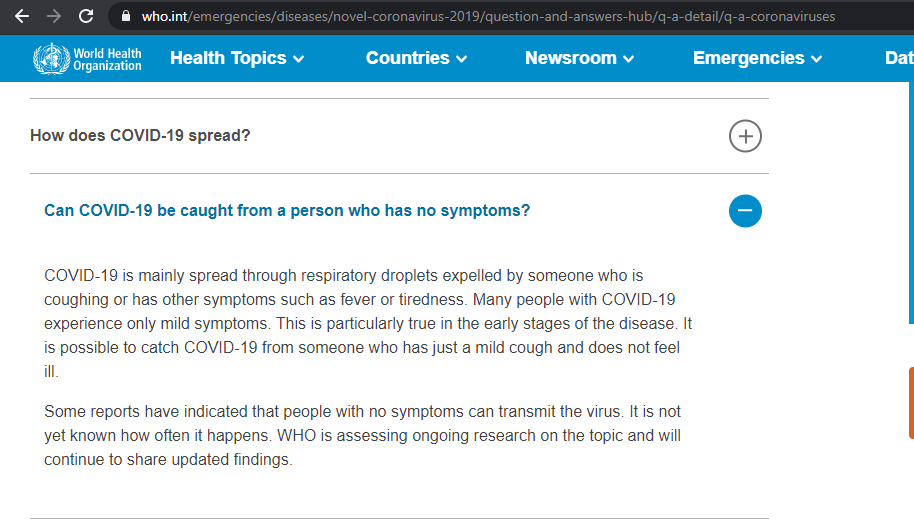
Health Secretary Francisco Duque III insisted that asymptomatic carriers of the novel coronavirus are not contagious but studies have concluded that they may contribute to transmitting the virus among people they come in contact with.
At a Senate hearing into the government’s response to the COVID-19 pandemic on Wednesday, Duque mentioned that the World Health Organization has “no report or evidence” that shows asymptomatic carriers can be contagious so far.
Asymptomatic refers to an infected individual who does not have any symptoms of the viral disease.
The health chief was answering Sen. Nancy Binay who inquired how the government can trace asymptomatic people since there are certain criteria set by the department when it comes to testing people for infection when he made the remark.
The DOH only conducts testing for symptomatic individuals, those coming from other countries, all of the close contacts of COVID-19 patients and those who tested positive in rapid antibody tests.
“There’s also what’s called ‘positive but no exposure.’ Or they don’t fall under the four criteria. So how could be track these spreaders that we call asymptomatic?” Binay asked Duque.
He answered that the country’s testing capacity is “limited” so the DOH can only “conduct surveillance” of people with influenza-like illness and those with severe acute respiratory infection through the help of municipal or city health officers.
Despite Duque’s explanation, Binay insisted that there are people with COVID-19 who do not have symptoms.
“You’re afraid that they might infect others, right?” Duque said.
“Yes, because aren’t they the ones who are called silent spreaders, these people who are asymptomatic?” Binay told him.
In response, the health chief said that “the WHO, up to now, has no report or evidence showing that those who are asymptomatic are contagious.”
What the WHO and DOH said
The WHO in its situational report released April 2, 2020 stated that “there has been no documented asymptomatic transmission.” It didn’t discount, however, the possibility of it occurring.
“This does not exclude the possibility that it may occur. Asymptomatic cases have been reported as part of contact tracing efforts in some countries,” it said.
The WHO’s website section called “Q&A on coronaviruses (COVID-19)” also indicated that an asymptomatic carrier “can transmit the virus.”

Aside from this, the DOH’s COVID-19 frequently asked questions (FAQs) section itself also said transmission of the COVID-19 even without symptoms is possible.
The DOH website, however, said that “the risk of getting COVID-19 from a person without any signs and symptoms is very low.”

What independent studies say
Duque’s remarks also prompted some Filipinos to share links of studies conducted by other countries which indicate that asymptomatic carriers may infect others.
GMA broadcast journalist Atom Araullo quoted an editorial written by physicians and published in The New England Journal of Medicine titled “Asymptomatic Transmission, the Achilles’ Heel of Current Strategies to Control Covid-19.”
“…the clear evidence of SARS-CoV-2 transmission from asymptomatic persons and the eventual need to relax current social distancing practices argue for broadened SARS-CoV-2 testing to include asymptomatic persons in prioritized settings." https://t.co/8g1Guhk0U9 https://t.co/XebK4LYF1l
— Atom Araullo (@atomaraullo) May 20, 2020
The editorial cited a study where a COVID-19 outbreak happened in a skilled nursing facility in Washington in the United States.
It concluded that “transmission from asymptomatic residents infected with SARS-CoV-2 most likely contributed to the rapid and extensive spread of infection to other residents and staff.”
The study also said that “unrecognized asymptomatic and presymptomatic infections most likely” contributed to the transmission as well.
It recommended the “universal use of face masks,” among others, since “symptom-based strategies for identifying residents with SARS-CoV-2 are insufficient for preventing transmission” in the nursing facility mentioned.
A Twitter user claiming to be a doctor similarly reacted against DOH’s claim that “asymptomatic persons have the least risk of transmitting COVID-19.”
“This statement is not only false, it is very, very dangerous,” she said and then shared the similar editorial that Araullo had posted on Twitter.
Excuse me, what? Allow me to share a few published research articles on the transmission of SARS-CoV-2, and why this statement is not only false, it is very, very dangerous. A thread. https://t.co/uP94NbTWYR
— Celestine Trinidad (@luckychan) May 20, 2020
“Also the thing about that this study is that they actually measured viral loads—meaning the presence and number of viruses in these patients—and this was high even in the asymptomatic group,” the online user said.
She also cited another study published in The National Center for Biotechnology Information which studied the case of 24 asymptomatic patients in China.
“Through epidemiological investigation, we observed a typical asymptomatic transmission to the cohabiting family members, which even caused severe COVID-19 pneumonia. Overall, the asymptomatic carriers identified from close contacts were prone to be mildly ill during hospitalization,” the study said.
Another Twitter user shared a link of another study‘s early release, though not yet final, published by the Centers for Disease Control and Prevention.
Interesting. Ito source niya: https://t.co/cozsO9X3Xj
But an early release already contradicts it: https://t.co/XH0zxuB2XA
— Nikko Reyes (@niknokseyer) May 20, 2020
The study noted that there is epidemiological evidence that presymptomatic or asymptomatic transmission of the virus has occurred “within families or households, during shared meals, or during visits with hospitalized family members” in China.
Another Twitter user shared a news article by CNBC which reported recent findings of researchers in the National Institutes of Health in the United States.
Lol. They can still spread the virus. Hindi lang kasing laki ng range ng mga symptomatic.
It doesn’t have to be as forceful as a cough. Pwedeng sumama yung virus normal breathing, or talking.https://t.co/jwEIt4AIaS
— CitizenCat 🐈 (@CitizenCass) May 20, 2020
“Speech droplets generated by asymptomatic carriers of severe acute respiratory syndrome coronavirus 2 (SARS-CoV-2) are increasingly considered to be a likely mode of disease transmission,” CNBC said as it quoted the study published in the Proceedings of the National Academy of Sciences of the United States of America.









